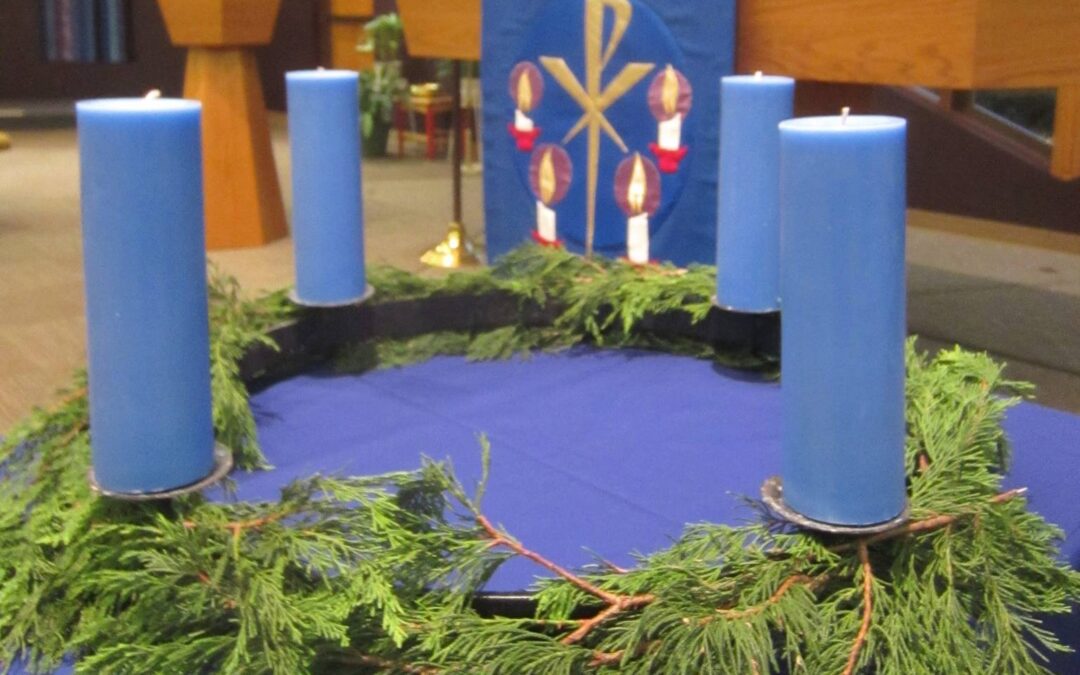Sermon for the First Sunday of Advent – December 1, 2024
CLICK HERE for a worship video for December 1
Sermon for the First Sunday of Advent – December 1, 2024
Luke 21:25-36
Dear friends, grace to you and peace from God our Father and our Lord Jesus Christ.
If you’re not expecting an eclipse, or if you don’t understand what an eclipse is, I can imagine that it would be terrifying. You’re going about your day, the sun is shining and the birds are singing, and then, out of nowhere, the sky begins to darken. But it isn’t just a cloud blocking the sun – something more is going on. This darkness falls fast. This darkness is deep. The air quickly turns cold. The birds stop singing. Within a few moments, right there in the middle of the day, it is pitch black. If you aren’t expecting it, or if you don’t understand what an eclipse is, it might well seem like something terrible is happening. It might well seem like the end of the world.
On April 8 of this year there was a solar eclipse which was visible in 12 U.S. states, including Texas. My oldest son is a student at Texas A&M University, and he and a few of his buddies skipped classes to go watch it. They drove a couple hours out of town to be in the path of totality. They pulled over beside a field, along with hundreds of other people who were doing the same thing. They watched as right there in the middle of the day the sky grew completely dark. The air turned cold. The birds stopped singing. They lifted up their heads and, through their eclipse glasses, observed the sun being blocked out by the moon, with only the corona visible as a fiery ring, which, interestingly, is called a halo.
My son was telling my wife and I about all this and he said that he was surprised to find that as he watched the eclipse, he got emotional. He struggled to explain why. The best he could convey was that he felt an overwhelming sense of awe. And he wasn’t the only one. It was a common reaction. Many others felt the same way, including the young men he was with.
So here were these tough young guys in cowboy hats, mostly members of A&M’s Corps of Cadets, wiping away tears while watching the eclipse. Instead of being afraid, they were in awe. They were overwhelmed with a joyful awe to be seeing what they were seeing. My son is an engineering major, and he choked back tears as he observed the orderly magnificence of the capital “E” Engineer of all creation.
My son and his Corps buddies lifted up their heads to greet this phenomenon because they knew what to expect. Even though it was an eerie darkness that fell across the land, they were overwhelmed with this joyful awe because they knew what was happening.
In our gospel reading for today Jesus says there will be signs in the sun, moon, and stars. He says many people will be terrified by these signs. There will be confusion and distress among the nations, Jesus says. There will be fear and foreboding. Jesus isn’t talking about an eclipse, specifically. He is talking about his coming again. He says that “this generation” will not pass away before these things take place.
The generation Jesus is speaking of here is not a time-specific generation, like we might refer to the Baby Boomers or Generation X or the Millennials. Every other time Jesus uses this word in the gospels he’s referring to those who do not believe in him, those who have rejected him. This generation, this group, will be around until his return. And they will respond to these signs with confusion and distress because they will not be expecting them. They will react with fear and foreboding because they will not understand what is happening.
“But that won’t be you!” Jesus says. “When you see these things taking place,” Jesus says, “stand up and raise your heads, for your redemption is drawing near.” Jesus has promised that these signs will point us to something which will fill us with joyful awe, and so our body language is that of anticipation and wonder. Jesus has promised that these signs will point us to his coming again, to our redemption drawing near, and so we assume the posture of hope.
Jesus goes on to give an additional promise, and a warning. He promises that heaven and earth will pass away, but his words will never pass away. And so in the midst of confusion and distress we have something to hold onto that will never change, never fail, never pass away. In the midst of fear and foreboding we have words promising us that our redemption is drawing near. We have eternal words promising us that forgiveness and life and salvation are ours forever no matter how dark it gets.
Jesus also warns us to be on guard. He warns us to not be weighed down with dissipation – which means overindulging in sensual pleasures. Jesus warns us against drunkenness – using alcohol or other substances to numb yourself or to take the edge off or using it as a counterfeit source of joy. Jesus warns us against being distracted by the worries of this life, being so caught up in our day-to-day needs that we fail to focus on him. I can’t think of a better set of warnings as we enter the holiday season, can you? Jesus warns us against all those things which can dull our senses to his presence. He exhorts us to keep alert. He encourages us to find our comfort and joy in his Word, in his promises.
Darkness creeps into our world, and into our lives, in many different ways. The signs Jesus describes can indeed be cosmic in scope, but they can also be deeply personal. They can come storming in as natural disasters like hurricanes, with the roaring of sea and waves, and they can come storming in at the tiniest cellular level, such as when you hear the doctor say the word “cancer.” They can come as distress among nations as they rattle their ICBMs at each other, and they can come through broken relationships that blow up families. They can come through literal earthquakes, and they can come through health catastrophes or the loss of a loved one or other deeply personal life crises when everything that seemed firm and solid and reliable has been deeply, painfully shaken and cracked.
Jesus isn’t telling us to just grin and bear it when these things happen. He isn’t saying, “Just put on a happy face.” Lament can be an appropriate response. Our Bible is filled with prayers of lament. Jesus himself lamented. Grief is natural and normal and necessary.
But at the same time, Jesus has told us what to expect. He has told us what is going to happen, in our world and in our lives. Darkness will creep in at times. There will be signs of his coming that will leave many in utter confusion and distress, in unrelenting fear and foreboding.
But not you. For you have heard Jesus’ words. You have heard words that will never pass away. You have heard Jesus’ promise that when these things happen, your redemption is drawing near. And so you can stand up. You can raise your heads. You can assume the posture of hope.
In just the last few months I’ve talked to a couple of people with life-threatening illnesses. And even though they are in the valley of the shadow, even though that darkness is creeping in, they have assumed this posture of hope. They’ve each said things like, “I’m in no rush to leave my loved ones, but I know where I’m going.” They’ve said things like, “I know I’ll be with Jesus soon, so it’s okay.”
This is what it means to stand up and raise your head. When we trust in Jesus’ promise to us, we can live our whole lives in this posture of hope. We can live our whole lives in this joyful awe. When the darkness creeps in, we can bask in the magnificence of his power and glory shining through the darkness, bringing happy tears to our eyes. We can cling to his precious words, which will never pass away even when everything else does.
Just a couple of chapters after Jesus spoke the words we hear today, Jesus was crucified. As he hung on the cross, darkness fell across the land. The air grew cold. The birds stopped singing. For three hours in the middle of the day it was pitch black. There was confusion and distress. But even in the darkness, the redemption of the world was drawing near.
When darkness falls over your life, do not be afraid. Stand up. Raise your head. Jesus has told you what to expect, that that makes all the difference.
Thanks be to God. Amen.
Rev. Jeffrey R. Spencer
Oak Harbor Lutheran Church




